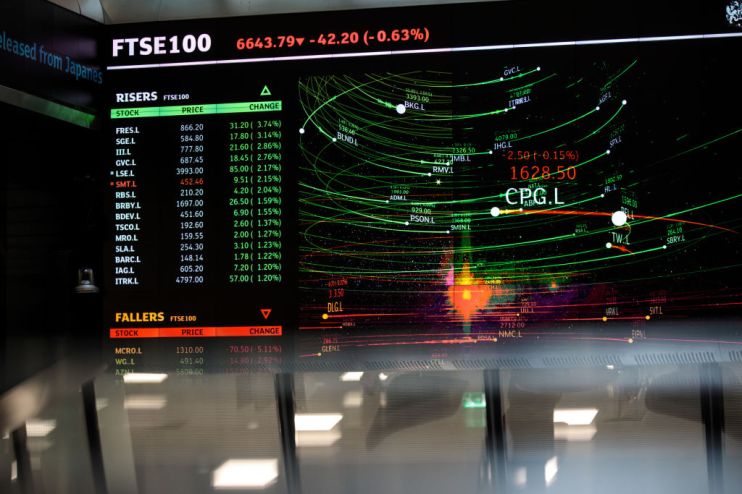FTSE 100 finishes in the red amid second wave concerns

The FTSE 100 has started the week on the back foot amid growing concern over a second wave of coronavirus infections.
As markets opened, the index fell 0.94 per cent to begin the day in the red at 6,233.28 points.
However, the FTSE 100 trimmed some of its losses to finish 0.76 per cent down by the close of trading at 6,244 points.
It comes as the UK reported its lowest daily Covid-19 death toll since mid-March, with a rise of just 15 to 42,647 on Monday.
But second wave fears sparked by a flurry of new infections in Germany still hurt the FTSE 100 and other markets.
US stocks also opened sightly lower this afternoon, after a jump in new cases in the country, but made up their losses.
Over the weekend, the World Health Organisation recorded the highest one-day increase in cases thus far, with 183,000 new infections confirmed.
The surge was driven by countries such as Brazil, the US, and India, while in Germany the ‘R’ rate rose to 2.9 due to an outbreak at a slaughterhouse.
Germany’s R rate rising above one meant European stocks lost out as fears overtook traders’ optimism of more central bank stimulus.
European markets followed the FTSE 100 down across Europe. Germany’s DAX dropped 0.55 per cent to 12,262. In France, the CAC fell 0.6 per cent to 4,949, while the Europe wide Stoxx fell 0.89 per cent to 3,239.
Before the Open: Get the jump on the markets with our early morning newsletter
US markets climb slightly
US markets did not fall as steeply as the FTSE at the open, but were still in the red initially.
However, both the Dow Jones and the S&P 500 rallied over the afternoon, standing at 0.47 per cent up and 0.54 per cent up respectively by 6.20pm UK time.
“Fear of a second wave of cases is denting the mood today, as the so-called R-number in Germany jumps to 2.88, US cases hit the highest level since early May, and Apple closes more stores in the US,” Neil Wilson, chief market analyst at Markets.com, said.
“White House trade adviser Peter Navarro said the US is preparing for a second wave in the autumn. It’s debatable whether the current spike in cases in some states is still part of the first wave.
“Equity markets remain sensitive to headline risk around virus numbers, stimulus and economic data. But we are still awaiting signs of whether the strong uptrend reasserts itself or whether we see a more serious pullback.”
In London, cruise liner operator Carnival led the slide, shedding 10 per cent at the close.
Meanwhile, British Airways owner IAG fell 4.6 per cent, and Rolls-Royce fell 4.5 per cent.
The fall came as Matt Hancock announced another partial easing of lockdown restrictions, this time for people who are shielding from the virus.
Advisory guidance for more than 2.2m people who are currently shielding indoors will be eased from 6 July to match that of the wider population.
Prime Minister Boris Johnson is also preparing to unveil the latest easing of the UK’s coronavirus lockdown for businesses tomorrow.
He is set to decide today upon reopening dates for pubs, hairdressers and restaurants as England continues to ease its lockdown.
And there are reports the two-metre social distancing gap could be scrapped for schools.
Manufacturing output ‘remarkably poor’
The falls also came as the Confederation of British Industry (CBI) reported that manufacturing remained in a deep downturn last month.
That will have come as no surprise, given that the country was still in partial lockdown in May, however the CBI said that output volumes fell at a record pace in the three months to June, exceeding the previous record from May 2020.
Its manufacturing output gauge dropped from minus 54 per cent in May to minus 57 per cent this month.
Anna Leach, CBI deputy chief economist, said: “The UK manufacturing sector remained in a deep downturn in June due to the ongoing COVID-19 crisis.
“Output volumes declined at a new record pace and export order books fell to an all-time low, reflecting the significant fall in demand in the UK and abroad.
“Firms are again hoping that this will ease somewhat in the next three months.”
FTSE 100 caught out as infections rise
AJ Bell investment director Russ Mould said “various headwinds and tailwinds” are buffeting the FTSE 100.
“On one hand there is positive news such as Spain accepting UK tourists without the need for quarantine,” he said.
“On the other hand, the US still seems to be struggling to contain the coronavirus and the risk of a second wave is still front of mind for many people.”
Energy, banking and travel stocks suffered on the FTSE 100 but gold miners like Fresnillo rose as gold reached a one-month high.
Meanwhile, the Bank of England’s governor Andrew Bailey today signalled he would reverse the Bank’s recent huge purchases of government debt before raising interest rates from their record low.
Writing for Bloomberg, Bailey said he would unwind the £745bn of bond-buying the Bank has committed to this year before hiking rates from their current low of 0.1 per cent.